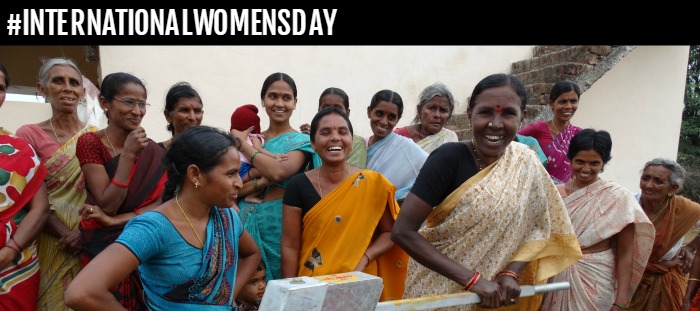
International Women’s Day
Today at drop4drop we are celebrating International Women’s Day and this year the theme is #pledgeforparity. International Women’s Day is a day in which we not only celebrate the many achievements of women globally but also call for an acceleration of gender parity and an end to the injustices which disproportionately affect women globally. Today, for example, the gender pay gap means that women earn, on average £6,200 less than men every year. Even Hollywood movies aren’t immune to gender inequality with countless infamous instances where actresses have been paid less than their male co-stars. The World Economic Forum predicts that, at the current rate, it will take until 2133 to close the gender gap entirely.
In India and sub-Saharan Africa where drop4drop operates, women are significantly more likely than men to take on the role of water collection. This often means that women are spending around 6 hours each day collecting water from jerry cans which, when full, can weigh up to 20kg. Medical problems associated with collecting water include pelvic deformities, chronic fatigue and miscarriage of children. To make things worse, current water sources are often in remote areas which can leave them highly vulnerable to rape and sexual assault.
In total women and children spend 125 million hours every day collecting water for their families. This is time which could be spent in education or in the creation of income which can help women to achieve financial independence from their families. In India alone, for example, it is estimated that 150 million work days each year are spent by women collecting water. Women and girls are also affected by lack of sanitation. 1 in 3 people do not have access to a toilet, and this lack of privacy can cause girls who go to school to stop attending when they reach puberty.
By installing clean and conveniently placed water sources we can allow girls to spend longer in education. Research has actually shown that for every 10% increase in women’s literacy, a country’s economy can grow by up to 0.3%. Importantly, when these educated women grow older they are more likely to provide financially for themselves. Access to clean water therefore not only provides economic benefits to an area as a whole, but also empowers women to obtain financial independence from their male relatives.
When we install bore-wells in India and sub-Saharan Africa, we ensure that women are included at every step. This instils a sense of ownership, pride and inclusivity. The unique skills these women acquire (such as bore-well maintenance) moves outside of traditional roles and guarantees that they are recognised as valuable members of their communities. This can only help to strengthen the respect, independence and employment opportunities they have, giving women a louder voice to be heard.